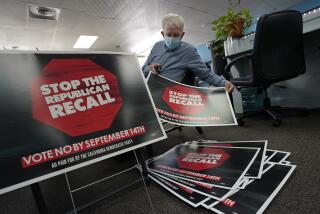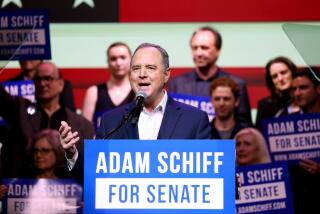GOP lawmakers and Jerry Brown have faulty logic
By Republican legislators’ logic, Democrat Gray Davis should never have been recalled as governor. After all, he had just been reelected the previous year.
What was there about the voters’ decision that the recallers didn’t understand?
Similarly, voters should never have been asked again whether they wanted redistricting reform, which Republicans favored to escape Democratic gerrymandering. Californians already had rejected that idea half a dozen times before finally saying yes.
The list goes on -- examples of voters reversing themselves. The point is that the main Republican rationale for rejecting Gov. Jerry Brown’s request for a special election on taxes is rubbish.
Brown asserted in his State of the State address Monday that “when elected officials find themselves bogged down by deep differences which divide them, the only way forward is to go back to the people and seek their guidance. It is time for a legislative check-in with the people of California.”
I don’t necessarily buy that, either, but more on shucking one’s responsibility later.
Brown’s remarks triggered an avalanche of Republican response along this line, from Assemblyman Jim Nielsen of Gerber in the rural Sacramento Valley: “We have already had two ‘legislative check-ins’ back in May of 2009 and November of 2010, and both times the voters had the wisdom to overwhelmingly reject new taxes.
“What don’t the Democrats understand about their clear and unambiguous message?”
And from the other legislative house came this from Senate GOP leader Bob Dutton of Rancho Cucamonga: “Taxpayers already said ‘no’ to a two-year tax extension in 2009. Why would they now vote to tax themselves for five more years?”
Well, here are some possible reasons:
There’s a new governor. He seems to have more credibility with the public, at least for the moment, than his predecessor, Arnold Schwarzenegger. The 2009 special election, for many, turned into a referendum on the Capitol’s unpopular politicians.
Not only was a two-year extension of temporary tax increases at stake in that election, but also a spending limit sought by the Republican governor and GOP legislators. That generated the perfect storm of opposition: from both the anti-tax and spending lobbies. Unlike then, labor unions presumably would strongly support Brown’s proposal.
The failure of Proposition 21 on last November’s ballot wasn’t a real test of whether voters would support a tax increase. It called for an $18 annual hike in the vehicle registration fee for a very narrow purpose: state parks. Many people didn’t see the connection between vehicle fees and parks, and it smacked of ballot-box budgeting run amok.
The state truly has reached the desperation stage. If Brown’s proposal to extend the income, sales and car tax increases is rejected, the only fallback -- short of more self-destructive borrowing -- would be shorter school years, even higher tuition, elimination of state welfare, crippling of healthcare and the release of many thousands of prisoners. Plus fewer fire crews, closed parks and a halt to highway repairs. For starters.
All that said, “check-ins” with the voters are what regular elections are about. The way our republican system of democracy was set up by the framers of both the U.S. and California constitutions, the people elect representatives to make decisions about spending and taxes.
You didn’t see either the Clinton tax increases or the Bush tax cuts being put to votes of the American people. That occurred at the next elections, when the people voted whether to rehire their representatives.
Only in screwy California, where we have an out-of-control initiative system and a bloated Constitution that Sacramento often stumbles over when it does try to make decisions, do voters perpetually get handed such policy-making power.
The gubernatorial recall, redistricting and park tax measures all got on the ballot through voter petitions. The spending limit was a constitutional amendment that required voter approval.
In his speech, Brown read from the California Constitution about all political power being “inherent in the people.” He also could have read about the Legislature making no law except by statute -- a bill -- and the law going into effect when a governor signs it. Nothing about a governor delegating the final say to the voters.
So Brown’s assertion that “it would be unconscionable” to tell the voters “that they have no right to decide” on tax extensions vs. deeper cuts also is rubbish.
The only right they have is the one personally granted by Brown in his campaign promise not to raise taxes unless voters approved. That helped get him elected. Now he’s stuck and prohibited, because of his own political game-playing, from exercising the full powers of a governor.
Of course, if Republicans won’t furnish the necessary two-thirds legislative vote to place a tax measure on a statewide ballot, it’s not likely they’d supply the two-thirds needed for a tax extension.
Actually, they don’t seem likely at this point to do much of anything in Sacramento except collect their $95,000 pay, plus $142 in tax-free per diem seven days per week.
They’re refusing to say how they’d balance an $85-billion general fund budget with $25 billion in cuts and no tax extensions. They know it’s impossible, practically and politically.
Republicans should participate: figure out specifically what they want -- business regulatory relief, public pension reform -- then strike a deal with the governor and Democrats. Otherwise, go home and save the state some money.
More to Read
Start your day right
Sign up for Essential California for news, features and recommendations from the L.A. Times and beyond in your inbox six days a week.
You may occasionally receive promotional content from the Los Angeles Times.







